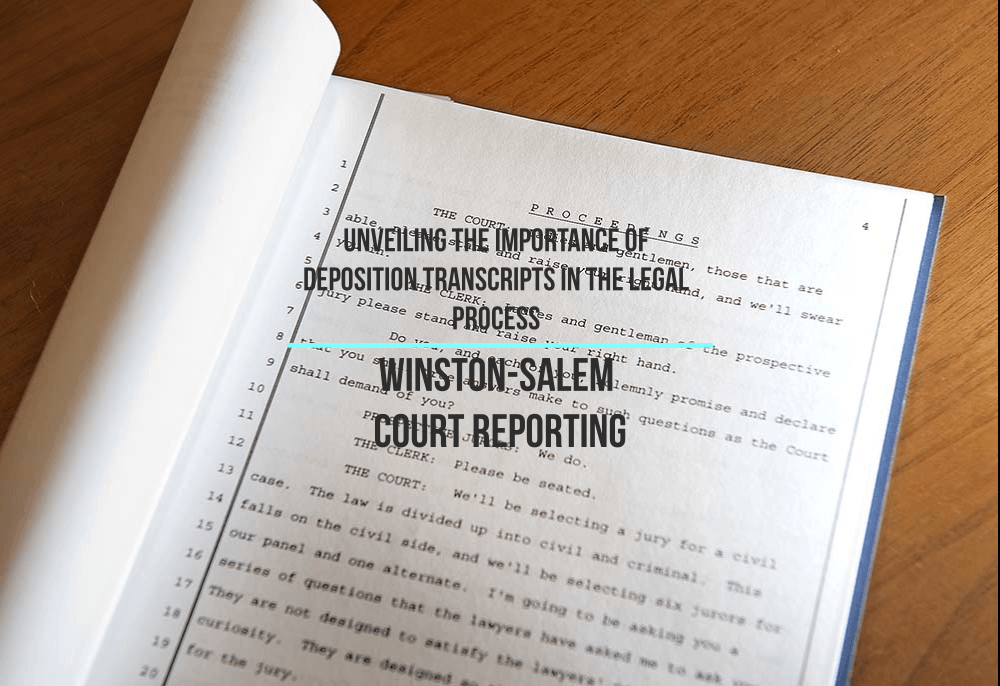Unveiling the Importance of Deposition Transcripts in the Legal Process

Depositions are a critical component of the legal process, allowing attorneys to gather sworn testimony from witnesses and build their cases. During these proceedings, accurate and comprehensive deposition transcripts are invaluable assets. In this blog, we will explore the significance of deposition transcripts and shed light on how they shape legal proceedings and facilitate effective case preparation.
1. A record that cannot be changed.
Deposition transcripts serve as an immutable record of the testimony provided by witnesses. They capture the exact words spoken under oath, preserving the intricacies of the deposition process. These transcripts are a vital resource for attorneys as they review and analyze witness statements, identify inconsistencies or contradictions, and develop their strategies accordingly. The precision and accuracy of deposition transcripts play a crucial role in ensuring justice and fairness within the legal system.
2. Essential Discovery Tool
Deposition transcripts are an essential tool during the discovery phase of a case. Attorneys use these transcripts to gain valuable insights into the opposing party’s position, strengthen their arguments, and uncover potential evidence. By carefully studying the deposition transcripts, attorneys can identify key points and use them to challenge witnesses during cross-examinations or support their own witnesses’ testimonies. These transcripts are invaluable for developing a comprehensive understanding of the case and formulating effective legal strategies.
3. Building a Strong Case
Deposition transcripts provide attorneys with a wealth of information to build a strong and persuasive case. By reviewing witness statements, attorneys can identify favorable or damaging testimony that can significantly impact the outcome of the case. The transcripts allow them to meticulously prepare for trial, highlighting inconsistencies, contradictions, or credibility issues that can be used to challenge opposing witnesses or support their own client’s version of events. A well-prepared attorney armed with thorough deposition transcripts can present a compelling case and navigate the complexities of the legal process with confidence.
4. Collaborative Case Preparation
Deposition transcripts facilitate collaborative case preparation among legal teams. Attorneys can share and discuss deposition transcripts with colleagues, paralegals, and experts to gain different perspectives and insights. These transcripts serve as a foundation for discussions and strategic planning, allowing the legal team to collectively analyze and interpret the information contained within them. Such collaboration enhances the overall quality of case preparation and helps ensure that all aspects of the case are thoroughly examined.
5. Documentation for Future Reference
Deposition transcripts also serve as valuable documentation for future reference. Attorneys can refer back to these transcripts during trial, redirecting witnesses or refreshing their memory on specific points raised during depositions. Furthermore, deposition transcripts can be used for post-trial analysis, appeals, or any subsequent legal proceedings. They serve as a permanent and reliable source of information, allowing attorneys to revisit witness testimony accurately and effectively.
Deposition transcripts are an integral part of the legal process, providing a verbatim account of witness testimony that can shape the outcome of a case. They serve as a crucial resource for attorneys during case preparation, discovery, and trial, enabling them to build strong arguments, challenge witnesses, and craft persuasive narratives. The accuracy, comprehensiveness, and accessibility of deposition transcripts contribute significantly to the pursuit of justice and the smooth functioning of the legal system.